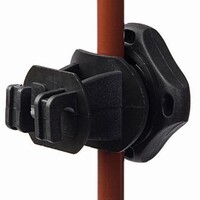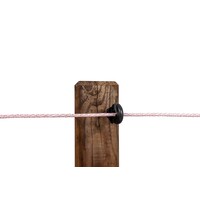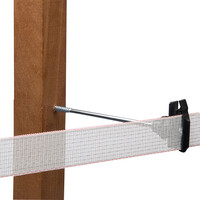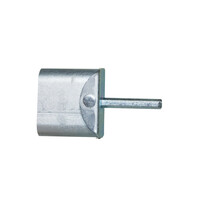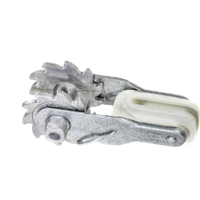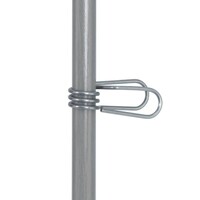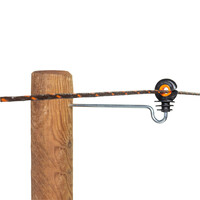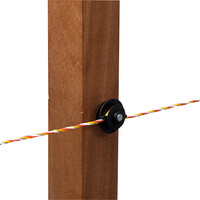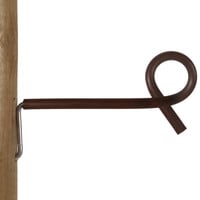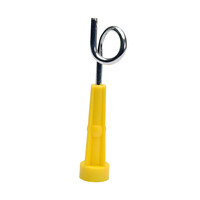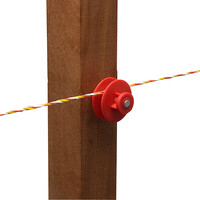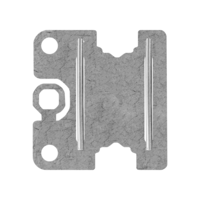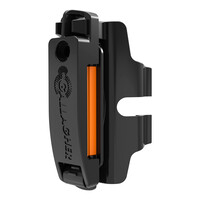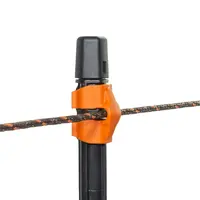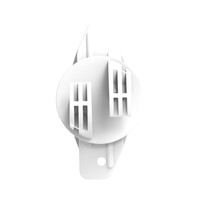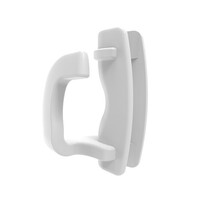What to consider when buying electric fence insulators
At Electric Fence Online, we are proud to supply our customers with a wide range of electric fencing insulators - from electric fence wire insulators to electric fence insulators for pipes and more! Choosing the right insulators will be key to maximize the efficiency of your electric fencing system and meet the requirements of your grazing fields.
Changes of direction and the end of your fence create a need for specific insulators which provide better tension along the fence line. Here you would require end of fence line and corner insulators. However, if you need to keep stock away from fencing, or keep extra distance from hedges, electric fence offset brackets are a great solution. They are also great for keeping animals apart.
Unsure of the right insulators for your system? Speak to our experts today through our Help Center.
Types of Electric Fence Insulators
There are several types of electric fence insulators that are used to help contain and control livestock and animals. These include:
Screw-in electric fence insulators
These insulators are used to attach the fence wire to a wooden post and are designed to be screwed into the wood. They are typically made of plastic or ceramic and have a screw that holds the wire in place.
Line-post electric fence insulators
These insulators are used to attach the fence wire to a metal line post and are typically made of plastic or ceramic. They have a hole or slot that the wire is passed through and then held in place with a clip or screw.
Corner electric fence insulators
These insulators are used to help hold the fence wire in place at the corners of a fence. They are typically made of plastic or ceramic and have a hole or slot that the wire is passed through and then held in place with a clip or screw.
T-post electric fence insulators
These insulators are designed to be used with T-shaped metal posts and have a clip or screw that holds the wire in place.
Off-set electric fence insulators
These insulators are used to create an offset in the fence wire, allowing the wire to be moved away from the fence post to prevent animals from leaning on or rubbing against the wire. They are typically made of plastic or ceramic and have a hole or slot that the wire is passed through and then held in place with a clip or screw.
Do you need insulators for electric fence?
Yes, insulators are necessary for installing an electric fence. Insulators are used to attach and secure the electrified wire to the fence posts, preventing the current from escaping the wire and grounding out.
How to install electric fence insulators?
Here are the general steps for installing electric fence insulators:
- Determine the type of insulators you need: There are different types of insulators for different types of electric fence wire (polywire, polyrope, high-tensile wire, etc.) and different types of electric fence posts (wooden fence posts, T-posts, metal fence posts, etc.).
- Mark the location of the insulators: Determine the spacing for the insulators based on the type of wire you are using and the fence's purpose. For example, a pasture fence with high-tensile wire may need insulators every 12-16 feet, while a temporary fence with polywire may only need insulators every 5-10 feet.
- Attach the insulators to the fence posts: Secure the insulators to the fence posts using screws, nails, or clips, depending on the type of insulators and fence posts you are using. Make sure the insulators are firmly attached and won't come loose over time.
- Thread the electric fence wire through the insulators: Thread the wire through the insulators, making sure it is held securely and won't slip out. Make sure the wire is not touching the fence posts or anything that could ground it out.
- Connect the electric fence energiser: Once you have installed the insulators and wire, connect the electric fence charger to the wire and turn on the power. Test the fence to make sure it is working correctly with an electric fence tester.
How far apart should electric fence insulators be?
The distance between insulators will vary depending on the type of electric fence wire being used. As a general rule, insulators should be spaced about 10-12 feet apart for high-tensile wire, 5-10 feet apart for polywire and polyrope, and 1-2 feet apart for low-tensile wire.
Does electric fence need insulators?
In summary, electric fences require insulators to keep the current flowing through the wire and prevent the current from escaping to the ground or other conductive materials. Insulators should be chosen based on the type of fence wire and fence posts being used, and spacing should be determined based on the wire type and fence purpose.
What makes the XDI electric fence insulator so remarkable?
The XDI electric fence insulator stands out as a truly exceptional product due to its innovative features and cutting-edge technology. One of its standout qualities is its remarkable strength, achieved through the implementation of new advancements. The inclusion of a sturdy metal core adds robustness and durability to the insulator, ensuring long-lasting performance even under challenging conditions.
Furthermore, the XDI insulator boasts a new design that significantly minimizes the risk of short circuits. This enhanced design provides a reliable and secure insulation solution, virtually eliminating the possibility of unwanted electrical interference or disruptions along the fence line.
To further enhance its practicality, the XDI insulator incorporates an orange PVC component. This serves as a wear indicator, offering a visual cue to monitor the condition of the insulator. By easily identifying signs of wear or damage, users can promptly address any issues and ensure the ongoing effectiveness of the electric fence system.
What sets apart ordinary fixing wires from plasticised clips for electric fence insulators?
When it comes to securing your electric fence wire, there are notable distinctions between ordinary fixing wires and plasticised clips. The key difference lies in their functionality and application.
Ordinary fixing wires are commonly used to fasten the electric fence wire to various support structures. They provide a reliable means of attachment, ensuring the wire remains securely in place. These wires are typically made of metal and offer a sturdy solution for affixing the electric fence wire to posts or other fixtures.
On the other hand, plasticised clips offer a specialized feature. They are specifically designed to facilitate the attachment of cord, such as rope or tape, to ecoposts or insultimber posts. These clips are made from a plastic material that provides flexibility and durability while securely holding the cord in place.
By utilizing plasticised clips, you can easily and securely connect cord-based electric fence components to the designated posts. This offers convenience and versatility in constructing and maintaining your electric fence system.
What sets apart a normal electric fence insulator from a corner insulator?
When it comes to electric fence installations, there are notable differences between a normal insulator and a corner insulator. The key distinction lies in their specific functions and capabilities.
A normal electric fence insulator is designed for regular sections of the fence line, where there is no change in direction or angle. It provides reliable support and insulation for the electric fence wire, ensuring it stays in place and effectively carries the electric current.
On the other hand, a corner insulator is specially engineered to withstand additional force and tension that occurs at corners or bends in the fence line. As the name suggests, it is utilized precisely at these points to offer superior strength and stability. The corner insulator is built to endure the increased strain and pressure that can be exerted on the fence wire due to changes in direction. It provides enhanced resistance and reinforcement to maintain the structural integrity of the electric fence, ensuring it remains secure and effective.
By using corner insulators at the appropriate points along your electric fence corners, you can ensure optimal support and longevity, even in areas where the fence wire experiences greater tension.
What distinguishes a PowerLine insulator from a TurboLine insulator?
When it comes to electric fence insulators, there are notable differences between the PowerLine and TurboLine options. The key factor that sets them apart is the quality and performance they offer.
The TurboLine insulator stands out as a premium choice, providing an even higher level of quality and durability. Built with advanced materials and design, the TurboLine insulator offers superior strength and reliability, ensuring long-lasting performance for your electric fence system. It is specifically engineered to withstand various environmental conditions and challenges, delivering optimal insulation and support for the electric fence wire.
On the other hand, the PowerLine insulator also provides reliable functionality and insulation for your electric fence. While it offers a good level of quality, the TurboLine insulator surpasses it in terms of overall performance and durability.
By opting for the TurboLine insulator, you can enjoy the assurance of exceptional quality and extended lifespan for your electric fence installation. Its robust construction and advanced features make it a top choice for those seeking the highest level of reliability and performance.
What are the benefits of the innovative TurboLine horse insulator?
The TurboLine horse insulator offers several advantages that make it a standout choice for electric fence installations designed for horses. Let's explore its key features:
-
Soft Cushions and Patented System: The TurboLine horse insulator features soft cushions that securely hold the tape between two rubber parts, utilizing a patented system. This unique design ensures a firm grip on the tape, preventing slippage and minimizing wear and tear. The tape can be effortlessly fixed in place with just one click, providing convenience and ease of use.
-
Enhanced Durability: With the TurboLine horse insulator, you can expect exceptional longevity. Its robust construction and high-quality materials guarantee a long lifespan, ensuring reliable performance over time. This durability factor contributes to cost-effectiveness and reduces the need for frequent replacements.
-
Additional Tightening Option: For added security, the TurboLine horse insulator offers the option to use an additional screw to tighten the insulator even further. This feature enables you to achieve maximum stability and ensures that the tape remains securely fastened, providing a reliable enclosure for your horses.
By choosing the TurboLine horse insulator, you can enjoy the benefits of its innovative design, including the soft cushioning system, quick tape fixation, guaranteed long life, and the option for extra tightening. These advantages make the TurboLine horse insulator an excellent choice for your horse electric fence needs.


